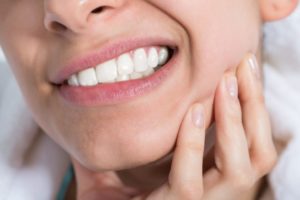 If you’ve ever spent a night tossing and turning from a toothache, it may seem like the pain increases after the sun sets. Dental pain can intensify at night for many reasons, like fewer distractions or what you ate for dinner. You can prevent a restless night by avoiding 5 common things that can make your toothache worse at night.
If you’ve ever spent a night tossing and turning from a toothache, it may seem like the pain increases after the sun sets. Dental pain can intensify at night for many reasons, like fewer distractions or what you ate for dinner. You can prevent a restless night by avoiding 5 common things that can make your toothache worse at night.
1. Sleeping Position
When you lay down to go to sleep, your blood pressure rises naturally. The increased pressure can push against the nerves and blood supply to your teeth. This can cause pain levels to soar, but sleeping with your pillow elevated will prevent blood from pooling in your head. You’ll ensure a throbbing toothache doesn’t cost you a good night’s rest.
2. Late-Night Snacking
You should skip snacking before turning in for the night, especially sugary foods and drinks. Sugar can aggravate untreated decay. If decay has created an abscessed nerve, the higher blood pressure can also intensify the pain.
Root canal therapy is the only way to treat the infection to stop the pain for good.
3. Bruxism
Recurring dental pain that may wake you up at night can be caused by bruxism. Grinding and clenching your teeth is a subconscious habit that often occurs while you’re sleeping. The pressure can put a strain on the ligaments that hold your roots in place. They can become sore and cause your mouth to throb. It can also aggravate TMJ disorders.
Reducing stress and anxiety can prevent teeth grinding. Your dentist can also provide you with a nightguard to create a protective barrier between the upper and lower arches.
4. Broken Tooth
Not all breaks are visible to the naked eye. Small cracks in the enamel can go unnoticed throughout the day until pressure is placed on a tooth. Clenching down or running your tongue over your tooth can cause sharp pain. However, rising blood pressure can also trigger discomfort.
It’s best to visit your dentist to find the source of your discomfort. You can take an OTC pain reliever before going to bed while waiting for your appointment.
5. Gum Recession
Pain and sensitivity are common if tooth roots are exposed from gum recession. Something as simple as taking a sip of cold water can make you pucker your lips. Brushing your teeth aggressively before calling it a night can also trigger pain.
Sensitivity toothpaste can help block pain at home until you’re able to see your dentist. They may recommend a gum graft or another treatment.
Never ignore dental pain or wait to see if it resolves with no treatment. It’s important to schedule an appointment with your dentist to find out what’s causing your toothache and what can be done to make it go away for good.
About Dr. Daniel J. Passidomo
Dr. Passidomo earned his dental degree from the University of Kentucky College of Dentistry and has regularly continued his education in various specialties, like endodontics, infection control, and restorative dentistry. Request an appointment through our website or call (937) 709-4038.








